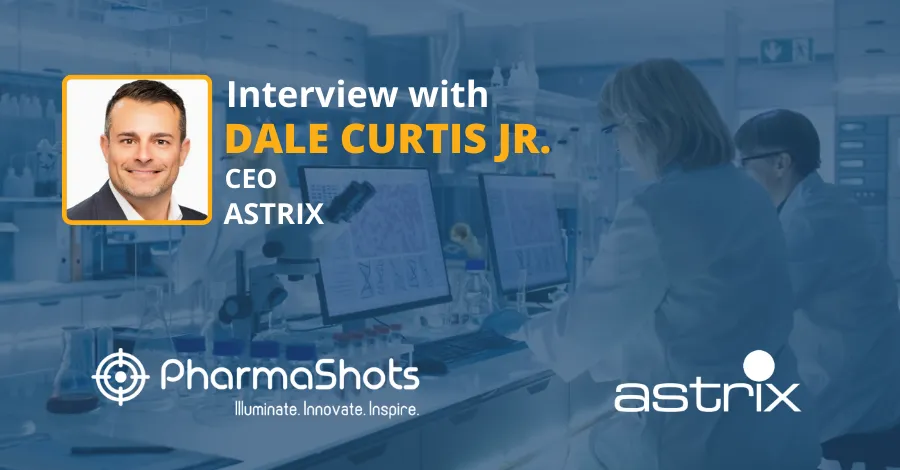
PharmaShots Interview: Myriad Genetics' Thomas Slavin Shares Insights on the Data Validating Breast Cancer PRS Across Ancestries
In an interview with PharmaShots, Dr. Thomas Slavin, M.D, Senior Vice President of Medical Affairs, Oncology at Myriad Genetics and study co-author shared his views on the data presented at ASCO 2021 and its implications for women.
Shots:
- Myriad Genetics data helps more women to control their health by helping them understand their lifetime risk of developing breast cancer. The new data validate the use of a polygenic breast cancer risk assessment in women across all ancestries
- The study looks at an individual's unique genetic polygenic risk scores (PRS), which is important because it explains a person's risk of developing certain diseases
- Myriad Genetics plans to launch riskScore for all ancestries later this year as part of its myRisk clinical test. In addition, the company will launch a standalone consumer version of riskScore in 2022
Tuba: What are the key takeaways from the data presented at ASCO 2021?
Thomas: The key takeaway from the data presented at ASCO is that Myriad Genetics developed a model to help women of all ancestries assess their genetic risk for breast cancer, something previously only largely available to women of European descent. This is one step toward achieving greater health equity in the field of genetics and can have a real impact on peoples lives.
This study looks at an individual's unique genetic polygenic risk scores (PRS), which is important because it explains a person's risk of developing certain diseases in this case, it provides a woman's potential risk of developing breast cancer, helping to clarify the need for increased or decreased breast cancer surveillance or management.
However, there are significant challenges in using PRS models across ancestries that this research aimed to solve. One such challenge is that genetic risk factors that make up a PRS differ by ancestry, which means if not properly calibrated, a PRS model developed in one population may over-or under-estimate risk in women from other ancestries. Also, risk association between genetic markers differs by ancestry, which means that a European PRS model is less effective at distinguishing high risk from low risk for breast cancer among women of non-European ancestry.
As part of this study, 93 breast cancer and 56 ancestral genetic markers were used to derive genetically determined ancestry and provide an accurate adjusted breast cancer risk. In a validation cohort of over 89,000 patients, we demonstrated that the new PRS model was appropriately calibrated and found to improve risk separation between those at high risk and low risk for breast cancer.
The power of the new model to separate high and low risk was improved across all self-reported ancestry groups (European and/or Ashkenazi, Asian, African, Hispanic, and Mixed Ancestry) and results reached statistical significance in all ancestry groups, marking an important step forward to continuous improvement and refinement of personalized risk stratification across all ancestries.
Tuba: How does this data will help the women dealing with breast cancer?
Thomas: This PRS advancement will be intended for women who are not diagnosed with breast cancer, rather for women that are looking to understand their risk of developing breast cancer. This work ensures that patients across all ancestries will have access to genetic testing, individualized breast cancer risk assessment, and best-in-class technology, furthering the goal of equity in care for patients.
Tuba: What is riskScore PRS tool?

Source: Myriad Genetics
Thomas: riskScore is Myriad's clinically validated breast cancer polygenic risk model, included at no additional cost as part of the Myriad myRisk Hereditary Cancer test. riskScore combines a patient's genetic markers (as reported in the polygenic risk score) with clinical factors (age, hormone exposure, etc.) and family history to calculate a personalized 5-year and remaining lifetime breast cancer risk estimate. It is currently limited to those of European ancestry, but we expect the work in question to expand the offering.
Tuba: Discuss the role of PRS as the risk prediction tool in the field of breast cancer.
Thomas: PRS is the most exciting advancement since testing for multiple hereditary cancer genes at one time. We can finally provide a genetically informed breast cancer risk result to all women even if they do not carry mutations in common breast cancer genes. I believe this is the future of personalized preventative medicine and I'm excited for what the future holds however, clinically, PRS is in its infancy.
In the future, PRS validated for women of all ancestries will allow improved, personalized breast cancer risk estimations for women carrying a mutation in known cancer-causing genes, such as ATM, or potentially BRCA1 or BRCA2. We are already applying our riskScore to give personalized risk results for CHEK2 mutation carriers of European ancestry.
Knowledge of a woman's PRS, as it relates to breast cancer risk, may aid in clinical decision-making regarding enhanced surveillance, adherence, and willingness to consider preventive medications.
From a precision medicine and public health standpoint, the PRS for all ancestries may help identify high-risk women who would otherwise not be clinically stratified and who may benefit from risk reduction counseling and intervention. It also may help identify low-risk women for whom less stringent screening programs may be acceptable.
Tuba: What is the other risk assessment PRS tools available in the market?
Thomas: Polygenic risk assessments utilize various genetic information and statistics to assess risk. As a pioneer in the field, Myriad's PRS model incorporates vast quantities of data with the most up-to-date genetic knowledge. Also, as this new study proves, our model is the only one currently validated for assessing risk across all ancestries.
Tuba: What are other Myriad offerings that advance the health and wellbeing of women?
Thomas: In addition to riskScore, Myriad Genetics has several genetics tests that advance the health and well-being of women at all stages of life. We empower individuals with vital genetic insights and enable healthcare providers to better detect, treat and prevent disease.
- Myriad myRisk Hereditary Cancer uses advanced technologies and proprietary algorithms to evaluate 35 clinically significant genes associated with eight hereditary cancer sites including breast, colon, ovarian, endometrial, pancreatic, prostate, and gastric cancers and melanoma. Our current riskScore offering is included in this test when appropriate.
- EndoPredict helps patients diagnosed with early-stage breast cancer assess their risk of recurrence. This, in turn, guides physicians to help determine who may consider safely forgoing chemotherapy or extended endocrine therapy.
- BRACAnalysis CDx (see below)
- Myriad Foresight carrier screen can help determine whether prospective parents carry any inherited health conditions that might be passed on to a child.
- Myriad Prequel prenatal screen is a noninvasive test that can be administered as early as 10 weeks into a pregnancy to determine a fetus odds of a chromosomal condition like Down Syndrome.
Tuba: Can you put some colors on the Myriad myRisk Hereditary Cancer? How is it improving the QoL of women dealing with cancers?
Thomas: Knowledge is power. Having a precise, genomically-informed risk estimate can help women make the most informed choices possible. Whether a gene mutation in BRCA1, CHEK2, etc., or a PRS score indicates a high, average, or low risk for breast cancer, patients can work with their doctors to appropriately develop informed breast cancer screening and prevention plans. These might include assessing the appropriate frequency for breast cancer screening, breast cancer chemoprevention strategies, or other personal choices.
Tuba: What would be your next move in the field of women's health?
Thomas: Myriad Genetics plans to launch riskScore for all ancestries later this year as part of its myRisk clinical test. In addition, we will launch a standalone consumer version of riskScore in 2022. The consumer version will further expand riskScore access to a new population of almost 100 million women who do not already qualify for hereditary cancer testing due to their personal or family history.
Tuba: What are the different CDx solutions you have developed in the past?
Thomas: BRACAnalysis CDx is an FDA-approved, laboratory-developed test for germline BRCA1 and BRCA2, intended to inform patient management related to the PARP inhibitors for patients with ovarian, breast, pancreatic, or prostate cancers.
Myriad myChoice CDx is the first and only FDA-approved tumor test assessing homologous recombination deficiency (HRD) that includes tumor sequencing of the BRCA1 and BRCA2 genes and a composite of three proprietary technologies (loss of heterozygosity, telomeric allelic imbalance, and large-scale state transitions). myChoice is the most comprehensive HRD test, enabling physicians to identify patients with tumors that have lost the ability to repair double-stranded DNA breaks, resulting in increased susceptibility to drugs such as PARP inhibitors.
Tuba: Are you planning to develop more CDx for breast cancer and other cancer indications?
Thomas: Yes, we have many ongoing pharma partnerships and trials in progress across a multitude of cancers.
Image Source: Health Europa
About Thomas Slavin:

Dr. Thomas Slavin is the Senior Vice President of Medical Affairs, Oncology at Myriad Genetics. He is triple-board-certified in clinical genetics, molecular diagnostics, and pediatrics.
Related Post: ViewPoints Interview: Janssen's Nan Li Shares Insights on the Data Presented at ISPOR 2021

This content piece was prepared by our former Senior Editor. She had expertise in life science research and was an avid reader. For any query reach out to us at connect@pharmashots.com














